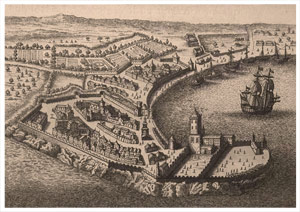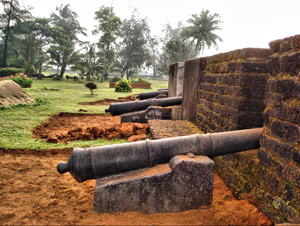The English is intolerant of the rise of the Dutch.
The French attacks the Dutch.
The valourous fight of William III.
The Dutch tightens their grip on the administration of Cochin.

1684
The Dutch Tightens Their Grip on the Administration
Though the English were intolerant of the supremacy of the Dutch being established in Malabar they strategically kept away from any open confrontation because of the relations the Netherlands and England had in Europe.
Louis XIV, lusty of absolutism, turned in to a nightmare to countries including England. But the reason behind the financial stability by which he raised palacious buildings like the Versailles Palace was the trade companies that spread in countries like India. Because of territorial ambitions he put forth claim over Belgium. The bewildered Dutch forged a Triple Alliance with Sweden and England. Though the war ended by a Treaty, later France attacked the Dutch. The very strategic and clever act of William-III, opening dikes and streaming out sea waves against the advancing army of the France which already had seized territories except Amsterdam, is famous. The Dutch, in the meanwhile decided to improve trade relations against France with countries including England.

It was in a new environment that Hendrik Van Rheede was coming to Cochin as the commander. He knew very well about Cochin. It was he, then an ordinary soldier, who took in to custody Queen Gangadhara Lekshmy, the matriarch of the royal family of Cochin, when she was there at the balcony of the palace of Mattanchery watching the invasion of the Dutch-an important act that paved the way for the decisive turning point in ending the war with the victory of the Dutch. Like Nieuhoff, Van Rheede was avidly interested in the medicinal properties of the herbage of Malabar. This interest paved the way for the creation of the world-renowned book Hortus Malabaricues.
With the advent of the Dutch, the kingdoms of Purakad, Alangad (Mangad), Vadakkumkoor, Paravoor and so on strengthened their ties with Cochin. Van Rheede tried to improve ties with the princely states besides trying to take hold of the control of Cochin, prior to which it was decided that the treaties signed with Cochin were to be altered. By the Treaty of February 1674, it was decided that the right to the throne of Cochin was limited to the members of the branch of Elder Matriarchy and of the branch of Chazhoor matriarchy. They got the right of supervision to mint money and coins. By the Treaty of September 1674, it was decided that the income and expenditure accounts pertaining to the kingdom should only be written by an official appointed by the Dutch. The authority to decide the amount of expenditure for the king and the younger generation was then left with the Dutch. With agreements signed with main chieftains, the political power too came under the control of the Dutch.

Van Rheede retired from the post of the Commander of Cochin in 1678 and later he was promoted as the Commissioner General. But he left Cochin when therearose revolts among the members of the royal family of Cochin and lords. Due to the audacity and disobedience of his nephews the king, leaving the town, started living in an interior rural area. He sent a letter to the Governor General at Batavia recording his woes. The king later signed a new agreement with Jocob Lobo, the substitute of Van Rheede, according to which the rule of the territory had to be carried out by the Paliath Achan in the name of the king and those who acted against royal decrees would be strictly punished. This was a strategy aimed at the right to appoint the prime-minister to be vested with the Dutch. By the new treaty signed between the new Dutch commander Martin Huysman and the king in 1681, Hendrick Reins became all powerful. When Paliath Achan died in 1684, Hendrick became the prime-minister since the next heir was under aged. This smooth transfer of power was facilitated by the operation of a clause contained in the treaty the king signed with the Dutch. And, thus reached the paramountcy of Cochin in the hands of the Dutch East India Company by means of treaties and conditions contained in them.